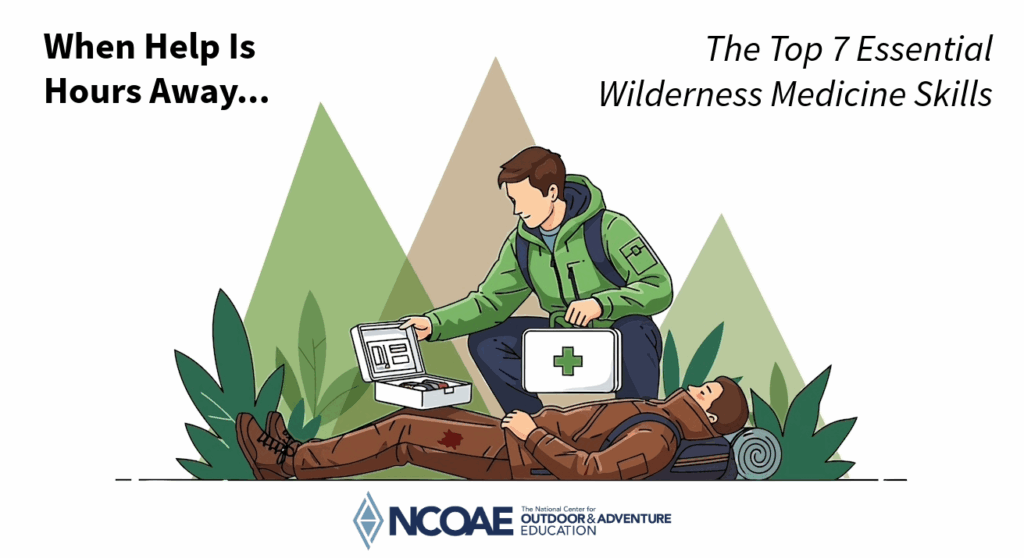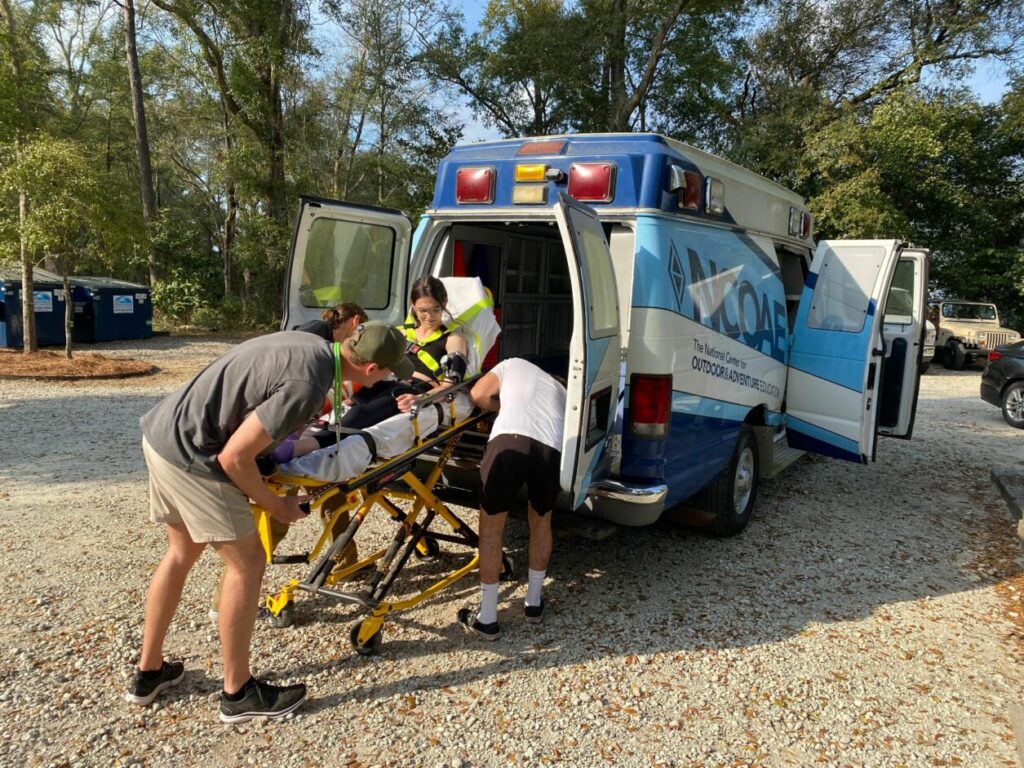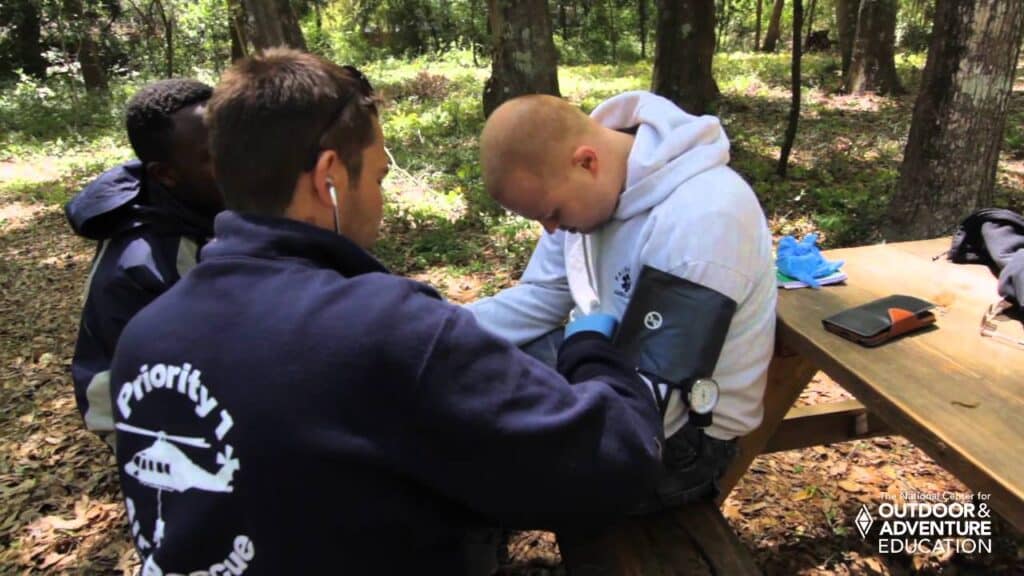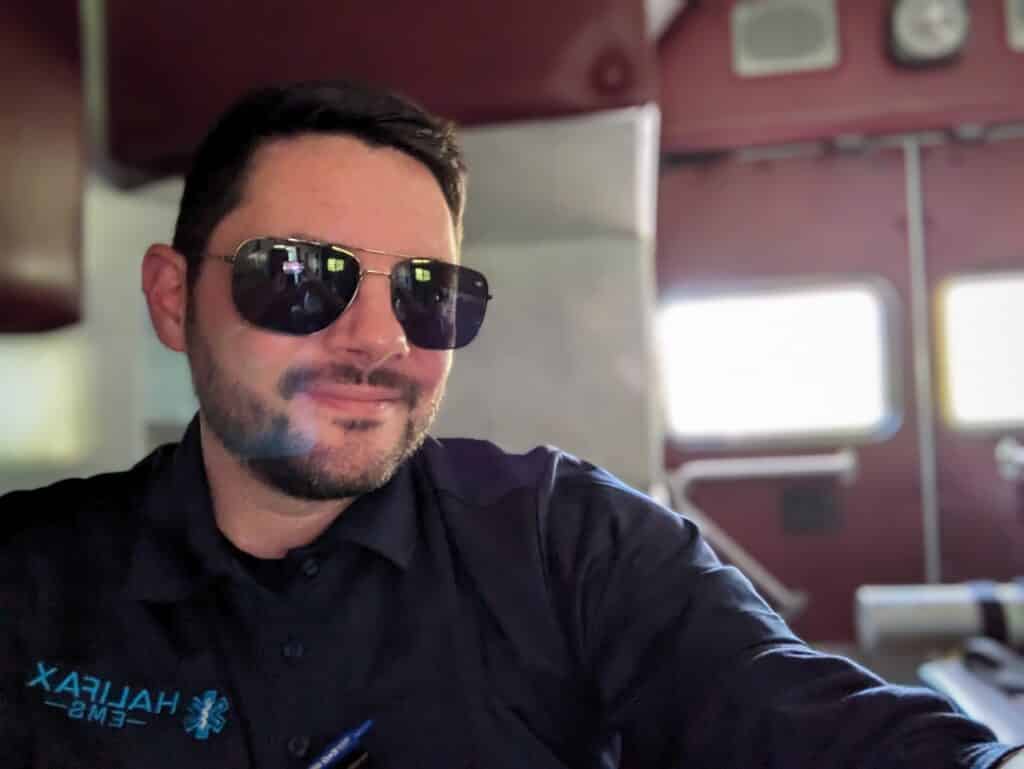When Help Is Hours Away: The Top 7 Essential Wilderness Medicine Skills
Wilderness MedicineWhen we venture into the backcountry, whether it’s a day hike in a nearby forest or a multi-day expedition into remote terrain, we knowingly trade comfort and convenience for solitude, challenge, and a deeper connection with nature.
This is a trade-off that comes with a conscious decision to expose ourselves to a higher-than-normal level of risk. Backcountry travel increases our chances of experiencing injury and illness while decreasing our accessibility to nearby basic or emergency medical care.
Mitigating this heightened risk requires improving our wilderness medicine knowledge and skills, something we help people do here at The National Center for Outdoor Adventure & Education (NCOAE). Our Wilderness Medicine and Emergency Medical Technician (EMT) courses cover everything from scene size-up and patient assessment to providing cardiopulmonary resuscitation (CPR), treating wounds and fractures, and successfully evacuating patients from remote wilderness areas.

As experts in the field of wilderness medicine, we often find ourselves discussing what we believe to be the most essential wilderness medicine skills. Here, we present our top seven, in no particular order. These are skills that we think all of our students should possess before venturing into the backcountry.
1. Scene Size-Up and Patient Evaluation
Every wilderness medicine event should start with a scene size-up and patient evaluation, which consists of the following three components: (more…)
Basic Versus Advanced Airway Management: Keeping It Simple (at First)
Emergency MedicineIn the backcountry, where hospitals are likely many miles away and help isn’t “just around the corner,” airway management becomes a high-stakes priority. After all, the statistics are against the patient. Without an open, clear airway, that patient has a zero percent chance of survival.
Whether it’s a fall, an allergic reaction, choking, or a drowning, keeping the airway open is a life and death proposition. Wilderness medicine demands quick thinking, decisive action, and a solid grasp of airway basics, because you’re the first, and perhaps only, responder.
This post brings you up to speed on airway management basics with a focus of first employing the simplest and least invasive methods for opening the airway.
What Is the Airway?
The airway is a tunnel connecting the mouth and nose to the lungs. It ends at the alveoli, which are the tiny air sacs in the lungs that facilitate the exchange of gases, primarily oxygen and carbon dioxide. As long as this tunnel remains open, a person can breathe. If the tunnel collapses or is blocked at any point, breathing ceases or is restricted to some degree.
Healthy humans maintain an open airway by holding their head upright, swallowing their secretions, controlling their tongue, coughing, spitting, and otherwise emptying the tunnel of everything but air. Whenever the airway collapses due to illness or injury or is blocked by solids or liquids “going down the wrong pipe” and getting stuck there, medical intervention is required. That’s where you, the emergency medical technician (EMT), or someone else who’s received the relevant training, must step in to clear the airway.
The interventions used by the EMT can be divided into Basic (simpler and less invasive) and Advanced (more complex and invasive).
Basic Methods for Clearing the Airway
When someone can’t breathe or is struggling to do so, you should use the simplest, least intrusive method necessary to open the airway. Basic methods include the following: (more…)
Intensive Self-paced EMT Certification Course for Oregon and North Carolina
EMT TrainingFinding a local EMT certification course provider and fitting the training into a busy schedule may seem like an insurmountable obstacle, especially if you’re still in school, working a full-time job — or both.
The solution? The National Center for Outdoor and Adventure Education’s (NCOAE’s) Intensive Self-paced EMT Certification Course, which gives you the freedom to learn at your own pace, from anywhere.
This flexible EMT certification in Oregon and North Carolina is designed for people who are passionate about emergency response, the Intensive Self-paced EMT Certification Course offers a comprehensive, hands-on approach to learning that combines in-depth coursework with practical, real-world applications.

With expert instructors, engaging online content, and field training opportunities, this flexible EMT course is tailored to meet the needs of busy learners. Ready to dive in? In this post, we share most of what you need to know about this unique course offering from NCOAE, point you to sources where you can find additional details and provide the many benefits of Self-paced EMT Training.
About the Intensive Self-Paced EMT Certification Course
Our team designed this 240-hour self-paced EMT training course to be comprehensive, practical, and efficient. The curriculum is divided into two phases: (more…)
Testing for EMT Certification: Past, Present and Future
EMT TrainingEmergency medical technicians (EMTs) play a vital role in the modern healthcare system, providing immediate, life-saving assistance to people experiencing acute medical conditions or traumatic injuries. By rapidly assessing and treating patients in critical situations, EMTs improve survival rates, minimize complications, and optimize treatment outcomes.

Training, testing, and certification ensure all EMTs have the skills needed to respond to life-threatening emergencies. In this post, we explore the history of EMT training and certification, bring you up to speed on its current state, and look ahead to its future. Why this matters to us here at The National Center for Outdoor & Adventure Education (NCOAE) is because we offer such training for EMTs throughout the U.S.
The Evolution of EMT Testing: Past to Present
EMT testing and certification have evolved over the course of nearly six decades. Formalized training didn’t begin until the late 1960s. It was initiated by the publication of a white paper in 1966 titled, “Accidental Death and Disability: The Neglected Disease of Modern Society.” The paper was in response to increasing trauma and death resulting from traffic accidents in the United States.
Up to that time, ambulance services generally consisted of team members with little to no formal training, with such services often relying on volunteers. And any formalized training and testing that was being done was administered locally by (more…)
Meet the NCOAE Student: Robert Fox, EMT Course Graduate
Student ProfilesWithin three weeks of graduating from the Intensive Hybrid EMT course offered by us here at The National Center for Outdoor and Adventure Education’s (NCOAE), Robert Fox had obtained his national and state emergency medical technician (EMT) licenses and had a job offer in hand at a local ambulance service.
Today, this Athens, Georgia, native works full time as an EMT. In addition — and in short order — Robert in on track to attend school to become an advanced emergency medical technician (AEMT) this fall. Advanced emergency medical techs provide basic and limited advanced emergency medical care and transportation for critical and emergent patients.

These advanced technicians possess the knowledge and skills necessary to provide patient care and transportation. And after that schooling? Robert is thinking about starting a paramedic program at a local community college.
So, what prompted such inspiration for our young graduate? Robert began his career as a senior wilderness guide, working in the field from 2007 to 2013. It was while taking a course to maintain his Wilderness First Responder certification that he became interested in more advanced emergency medical services (EMS).
But, sharing that the timing wasn’t right, Robert decided to work in behavioral health and criminal justice for (more…)
TALK TO US
Have any further questions about our courses, what you’ll learn, or what else to expect? Contact us, we’re here to help!